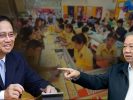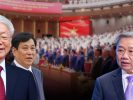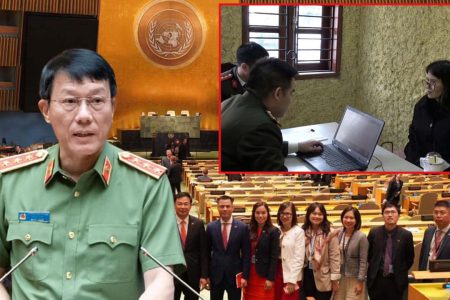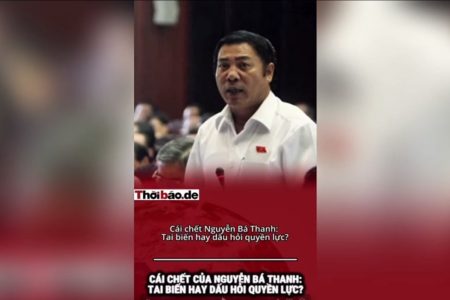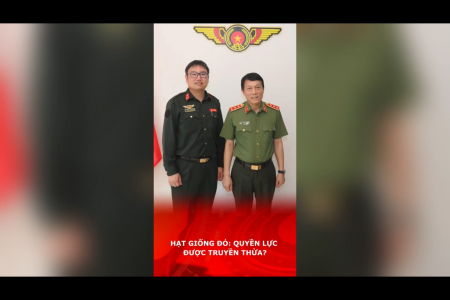
During 25 years of relations with Vietnam, human rights have always been one of the top priorities of the US government. Senior activists told VOA that despite the „technical“ differences between US governments, Washington’s goals have been „consistent“ over the past period.
“Since 1995, the US-Vietnam relationship has developed into a partnership in the fields of politics, economy, and the people-to-people relationship. We support Vietnam in contributing to international security, engaging in fair and reciprocal trade and respecting human rights and the rule of law,” the US State Department announced on the occasion of the two countries‘ 25th anniversary of diplomatic establishment in early July 2020.
On this occasion, in an interview with the Vietnam Foreign Ministry’s International Newspaper, US Ambassador to Vietnam Daniel Kritenbrink said: “The US is confident that all countries can reach their full potential when the human rights of its citizens are protected. Advancing human rights is still a major priority for the US, and a matter of close concern.”
“We often work with the Government of Vietnam on issues related to human rights, including the US-Vietnam Human Rights Dialogue. We also raise these issues with the Vietnamese Government at all levels, including in my meetings with senior Vietnamese leaders,” added the US diplomat.
From Virginia, human rights activist Doan Viet Hoat, who had been imprisoned by the Hanoi government before Vietnam established its diplomatic relation with the US in 1995 and was campaigned by Washington for Hanoi’s release in 1998, told VOA.
“The US is a country that respects human rights – the basic freedoms of the people. In relations with nations, the US has always placed the issue of respecting human rights first. For Vietnam, from the outset, the US raised the issue of human rights at the forefront, and paid special attention to prisoners of conscience – who are imprisoned for fighting for basic human freedoms.”
“Human rights are always a matter of priority and importance, although it may vary depending on the government, depending on the president, and the executive body has differences, mainly in terms of technical measures and timing, but in general, its purpose is still to emphasize human rights.”
„Human rights is a [Washington’s] very thorough policy in US-Vietnam relations.“
On February 3, 1994, US President Bill Clinton announced the removal of a 19-year economic embargo against Vietnam, and said that human rights were a major factor in future relations with Vietnam, when he launched a mechanism to carry out human rights dialogue with Hanoi, besides the top priority at the time was the issue of US prisoners of war and missing soldiers.
In February and August 1994, the US Department of State officials and the Vietnamese Ambassador to the UN launched the first „human rights“ dialogue sessions.
From 1994 to the time when the Clinton administration announced the normalization of diplomatic relations with Vietnam on July 11, 1995, dozens of US congressmen spoke out about Hanoi’s human rights violations, especially the special note of political prisoners such as journalist Doan Viet Hoat, doctor Nguyen Dan Que, lawyer Doan Thanh Liem, Venerable Thich Huyen Quang, etc.
Doan Viet Hoat told VOA:
“The international pressure when I was imprisoned for the first 12 years (1976-1988) was weak, but when I was arrested again from 1990 to 1998, the international pressure was stronger. Not only from the US but also from European nations and the UN.”
„International intervention is becoming more and more effective and there are also many changes in the country, especially people have more freedom,“ Doan Viet Hoat said.
But US and Western countries‘ human rights intervention was viewed by the Vietnamese government as a „peaceful evolution“ as the 7th Plenum of the Communist Party of Vietnam’s Central Committee in the 7th tenure in 1994 first pointed out as a risk for leaders, along with the expression „self-evolution“ and „self-transformation“ within the party.
Because of being alert to the risk of „peaceful evolution,“ Vietnam sees US human rights and democratic pressures as an act of violating Vietnam’s „internal affairs“ in order to overthrow the existing government. Professor Nguyen Manh Hung, from the Department of Politics and International Relations at George Mason University, Virginia, the US, said in the International Studies journal of the Diplomatic Academy of Vietnam.
“Human rights are an inherent part of US foreign policy, but it is not the most important factor. US foreign relations include many aspects: political, strategic, economic and human rights,” Professor Nguyen Manh Hung said.
“Normally, as strategic and economic concerns grow, human rights concerns are relatively diminished. In other words, whether the issue of human rights can cause great difficulties in Vietnam – US relations or not depending on how the two sides deal with this issue,“ said Professor Nguyen Manh Hung.

The 22nd Vietnam-US Human Rights Dialogue in Washington, DC, May 17, 2018. Twitter EAP US Department of State
From 1994 to present, the US Department of State and Vietnam’s Ministry of Foreign Affairs and the Ministry of Public Security have carried out all 23 rounds of human rights dialogues, a major topic that can always cause disagreements in the relationship between two countries. However, there was still a two-year hiatus from 2003-2004, due to the tougher administration of President George W. Bush on religious freedom and human rights to Vietnam and the decision to place Vietnam on the list of countries of particular concerns (CPC) regarding religious freedom . The reason was because Hanoi did not meet Washington’s request to release some people held for religious beliefs and other requirements.
From Ho Chi Minh City, Pastor Nguyen Hong Quang of the Mennonite Church which is not recognized by the state, stated to VOA about the effectiveness of the annual Vietnam-US human rights dialogue:
“Before 1995, up to now, there have been more than 20 times of human rights dialogues, especially on religious freedom. Although much attention has been paid to it, the effectiveness is not great. We have not yet enjoyed true religious freedom and the government is still not ready to cooperate with us – unregistered religious institutions. Therefore, freedom of religion and belief in Vietnam has not been given due attention according to the universal standards of the international community.“
In 2013, when US President Barack Obama and Vietnamese President Truong Tan Sang announced a Comprehensive Partnership, the issue of human rights was once again addressed, along with other topics such as diplomacy. and politics, economics, trade, science, technology, education and training, environment and health, war heritage, defense and security, culture, and sports and tourism.
In the preface to the Dialogue with the US Mission, published in November 2019, Lieutenant General Nguyen Van Huong, former Deputy Minister of Public Security of Vietnam, wrote: “Even though the two countries have normalized relations from in 1995, but the aftermath of the war and differences in political views still made Vietnam-US relations always have disagreements and barriers. During the post-normalization period, the US always placed the distinction between two political systems such as democracy, human rights, and religious freedom as binding conditions in bilateral relations, using two issues. This is like a tool to interfere in Vietnam’s internal affairs.”
Mr. Huong said: „The imposition of democracy and human rights by US values is still persistent to this day, but much reduced compared to previous periods.„
„Vietnam’s human rights record has been declining in recent years, but it is still a challenge to improve bilateral relations,“ a June 2020 report by the US Congress (CRS) said.
„Although President Donald Trump’s administration does not generally address the issue of human rights abuses, some members of Congress still emphasize human rights conditions in Vietnam,“ the CRS report added.

CRS writes: “Over the past three decades, the Vietnamese Communist Party seems to have followed a strategy that allows forms of expression of personal opinion and religious freedom, while still suppressing a number of individuals and organizations criticize the government. „
Over the past quarter century, US lawmakers have repeatedly spoken about the human rights abuses of the Vietnamese government. Human rights issues have a pervasive impact in the fields of military cooperation, security, defense, trade, investment … as the number of political prisoners has increased over the years, until now more than 250 people.
Under the „agreement“ between Washington and Hanoi, some Vietnamese political prisoners were taken from the prison to the airport and then to the US, starting with lawyer Doan Thanh Liem in February 1996, journalist Doan Viet Hoat September 1998, went to writer Tran Khai Thanh Thuy in June 2011, lawyer Cu Huy Ha Vu in April 2014…. and the nearest case of activist Tran Thi Nga in January 2020.
„The US-Vietnam relationship is very important to our national security and US leadership in the Indo-Pacific,“ US Senator Cory Gardner said in a statement on the occasion of the 25th anniversary of the two countries‘ relations.
Mr. Gardner emphasized: “Vietnam must do more to meet its human rights obligations. The Vietnamese government should heed my calls to free journalists and protect freedom of expression. A strong commitment to fundamental freedoms can open up our full potential for cooperation.”
Similarly, Senator Jim Risch, Chairman of the Senate Foreign Relations Committee said: “In relations with Vietnam, the US must continue to prioritize important areas such as regional security, economic cooperation, and trade, as well as human rights and rule of law.“
Thoibao.de (Translated)
Vietnamese Source: https://www.voatiengviet.com/a/nhan-quyen-uu-tien-xuyen-suot-trong-25-nam-quan-he-viet-my/5514415.html

















